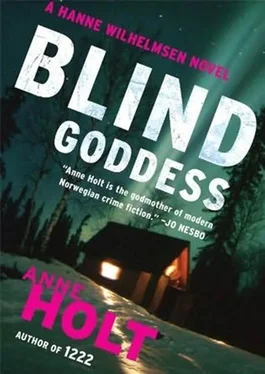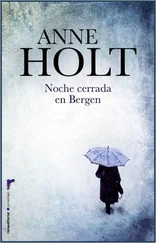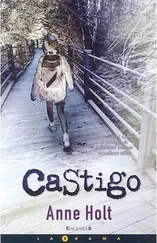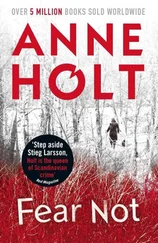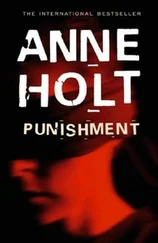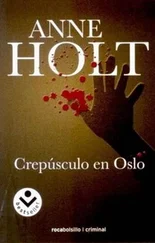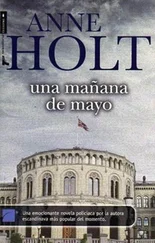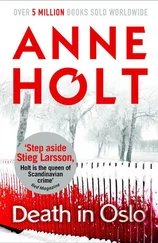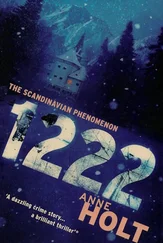“There’s not a single common element,” he said somewhat morosely. “Different weapon, different method, different location, completely different characters, and a different time. You’ll have problems convincing anyone!”
“But just listen-don’t get too fixated on the differences. Let’s see what similarities there might be.”
She was very excited, and counted off the points eagerly on her fingers.
“First of all, there was a gap of only five days between the murders.”
She ignored Håkon’s sardonic smirk and raised eyebrows.
“Secondly, we have no explanation at the moment for either of them. Admittedly we’ve identified the man by the River Aker: Ludvig Sandersen, drug addict for years and a conviction record as long as your arm. He was released six weeks ago after his last sentence. But do you know who his lawyer was?”
“Since you ask in that triumphant tone, I’ll guess at our deceased friend Olsen.”
“Bingo! That at any rate is some sort of connection.” Speaking more softly, she went on: “And not only was he Olsen’s client, but he had an appointment with him the day he was killed! Heidi has Olsen’s desk diary, and she spotted it straight away. Ludvig Sandersen had an appointment at two o’clock last Friday, and the next slot was crossed through. A long session, in other words. If it took place at all. We don’t know that it did, of course. But I presume his secretary can tell us that.”
Håkon had eaten most of the chocolate at breakneck speed, and Hanne had only managed to get a couple of pieces. Now she was shaping the gold foil into the form of a little bird while she awaited his response.
Suddenly they both started talking simultaneously, breaking off with a chuckle.
“After you,” said Håkon.
“There’s another thing.” Her voice now was lower still, even though the canteen was almost deserted and their nearest neighbour several tables away. “I’m not going to commit any of this to paper. I’m not going to mention it to anyone at all. Only to you.”
She made a gesture of putting her fingers in her ears, then leant towards him over the table.
“I had a guy in for questioning a short while ago about a rape. We brought him in purely on spec, because he’s got a record that costs him a visit here whenever we have an unsolved sex case. We quickly eliminated him from the enquiry, but he was extremely nervous about something. I didn’t pay much attention to it then-they’re always up to one thing or another. But this bloke was really frightened. Before he’d actually sussed out what we wanted him for, he let out a few thinly veiled hints about a deal. He said he’d heard on the grapevine that there was a lawyer behind some of the large-scale drug dealing, though I can’t remember his exact words anymore. You know what these people are like, they’re ready to tell lies even faster than they commit felonies, and they’ll try anything to get themselves out of a tight spot. So I didn’t attach much importance to it at the time.”
Hanne was really whispering now. Håkon had to lean across the table and put his head on one side to catch what she was saying. To anyone passing by they could have been lovers exchanging intimacies.
“I woke up in the night because I couldn’t get him out of my mind,” she said. “The first thing I did this morning was to dig out the old rape case file and check his name. Guess who his lawyer was.”
“Olsen.”
“Precisely.”
They both sat staring out over the hazy vista of the city. Håkon Sand took some deep breaths and sucked in air reflectively between his front teeth. Though realising it sounded unpleasant, he soon stopped.
“What have we actually got?” he said, and took out a blank sheet of A4 paper. He numbered down the page.
“We have a dead drug addict. The self-confessed murderer under arrest refuses to give motive.”
His pen scratched away on the paper, piercing the surface in his eagerness.
“It was such a thorough job that he wouldn’t have survived even if he’d had nine lives. Then we have a dead lawyer, killed in a rather more sophisticated manner. We know that the two murdered men were acquainted. They had an appointment for a meeting on the very day that one of them bought it. What else do we have?”
He went on without waiting for an answer. “Some vague and highly unreliable rumours about an unknown lawyer’s drug dealing. The rumour-monger’s lawyer was our dear departed Olsen.”
Hanne Wilhelmsen noticed that Håkon’s chin was twitching at the side of his mouth, like a muscle spasm.
“I think you’re onto something, Hanne. I think maybe we’re onto something big. But what’s the next step?”
For the first time in the conversation Hanne leant back in her chair. She drummed her fingers on the table.
“We keep everything under wraps,” she declared. “This is the faintest scent I’ve ever had to base a serious investigation on. I’ll keep you posted. Okay?”
* * *
The hit squad were the black sheep and also the great pride of the force. Usually in jeans, and in many cases long-haired or unkempt, these officers never felt bound by any dress code once they joined the squad. Nor did they need to. But at times they flouted other more sacrosanct rules and regulations, and were not infrequently carpeted by the head of personnel or even by the commissioner. They would agree to everything and promise to improve, but held up two fingers as soon as they were out of the door. Over the years some had gone too far and had been transferred to the most excruciatingly boring office duties, if only temporarily. Because actually the police loved their denim-clad brethren. The hit squad were effective, industrious, and were subjected to constant visits by colleagues in Denmark and Sweden, who came to police headquarters with only vague concepts and left prostrate with admiration.
Just the previous week, during a visit by a group from the Stockholm police, a Swedish TV crew came out with them one night. The boys took the TV people to an address they knew they could bank on, a prostitute who always had a few grams of some substance or other lying around. It was easy to break down the door, because there wasn’t much of the frame left after an earlier visit. They stormed into the darkened room with a cameraman in tow. On the floor was a middle-aged man in a bright red low-cut dress with a dog’s collar round his neck. As soon as he saw the uninvited guests he burst into paroxysms of tears. The police tried to console him and assure him that it wasn’t him they were after. But when they discovered four grams of hash and two fixes of heroin on bookshelves full of ornaments but devoid of books, they asked for the identity papers of the man on the floor anyway. Sobbing profusely, he fished out a khaki wallet. The policemen could scarcely suppress their mirth when they saw from the ID card that the man was an army officer. His despair was entirely understandable. Such circumstances, though not offences in themselves, had to be reported to higher authority on the seventh floor, the Special Branch. What happened to him then, no one in the hit squad knew; but the Swedish TV crew derived a lot of amusement from the incident, even though for the sake of decency nothing was ever broadcast.
The hit squad’s role was implicit in its name. Their job was to turn up unexpectedly and create confusion in the drugs world, to prevent and to prosecute drug trafficking, and to discourage new recruits to the business. They weren’t undercover agents in the American sense, so it wasn’t essential for them not to be recognisable as police officers. The slovenly image that the majority of them had adopted was more to do with relating to the drugs environment than with pretending to be something they weren’t. They knew about most of what went on in the Oslo underworld. But even if in that respect they were head and shoulders above other sections of the force, the problem was that all too often they couldn’t prove anything,
Читать дальше
